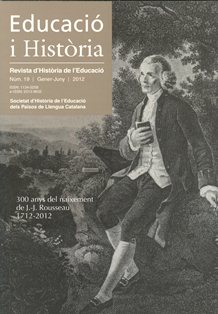Els Passeigs de Rousseau: solitud, rememoració i herborització
Article Sidebar

Main Article Content
Jordi García i Farrero
This paper, which aims to study the walks of Jean-Jacques Rousseau (1712-1778),
is configured in two parts. On the one hand, we indicate that it is in the last stage of
the author's life that one can more explicitly perceive his true Homo Viator. During
that period, as can be seen in his autobiographical works, he was subjected to harsh
accusations from encyclopaedists, and the act of walking became the most appropriate
activity as it allowed him to think and recall the past and, at the same time, soothe
his ego, which was sad, hurt and despised by high and enlightened French society. In
any event, Rousseau's manner of walking about was a sort of lonely self-exile from the
cities and social apparatus and characterized by contact with nature, and well demonstrates
his new and main occupation: gathering plants. Lastly, this article attempts
to reflect on the educational trend that emerged in the late nineteenth century (pedagogical
neo-nomadism) as the author's mobile activity, which could be perceived as a
field trip, is a clear precursor of Romantic Pedagogy.
is configured in two parts. On the one hand, we indicate that it is in the last stage of
the author's life that one can more explicitly perceive his true Homo Viator. During
that period, as can be seen in his autobiographical works, he was subjected to harsh
accusations from encyclopaedists, and the act of walking became the most appropriate
activity as it allowed him to think and recall the past and, at the same time, soothe
his ego, which was sad, hurt and despised by high and enlightened French society. In
any event, Rousseau's manner of walking about was a sort of lonely self-exile from the
cities and social apparatus and characterized by contact with nature, and well demonstrates
his new and main occupation: gathering plants. Lastly, this article attempts
to reflect on the educational trend that emerged in the late nineteenth century (pedagogical
neo-nomadism) as the author's mobile activity, which could be perceived as a
field trip, is a clear precursor of Romantic Pedagogy.
Article Details
How to Cite
García i Farrero, Jordi. “Els Passeigs de Rousseau: solitud, rememoració i herborització”. Educació i Història: revista d’història de l’educació, no. 19, pp. 17-33, https://raco.cat/index.php/EducacioHistoria/article/view/257862.
Most read articles by the same author(s)
- Albert Esteruelas i Teixidó, Jordi García i Farrero, Maig del 68 i la incidència en els discursos pedagògics pobres , Educació i Història: revista d'història de l'educació: Núm. 33 (Gener-Juny 2019)
- Jordi García i Farrero, Isabel Vilafranca i Manguán, Conrad Vilanou i Torrano, La Recepció de la filosofia de l'educació de Giovanni Gentile: del neoidealisme al neoespiritualisme , Educació i Història: revista d'història de l'educació: Núm. 27 (gener - juny 2016)
- Xavier Laudo Castillo, Albert Esteruelas i Teixidó, Jordi García i Farrero, Idees pedagògiques del taoisme: elements per a una pedagogia líquida entre la naturalesa i la norma , Educació i Història: revista d'història de l'educació: No. 23: (gener-juny 2014)